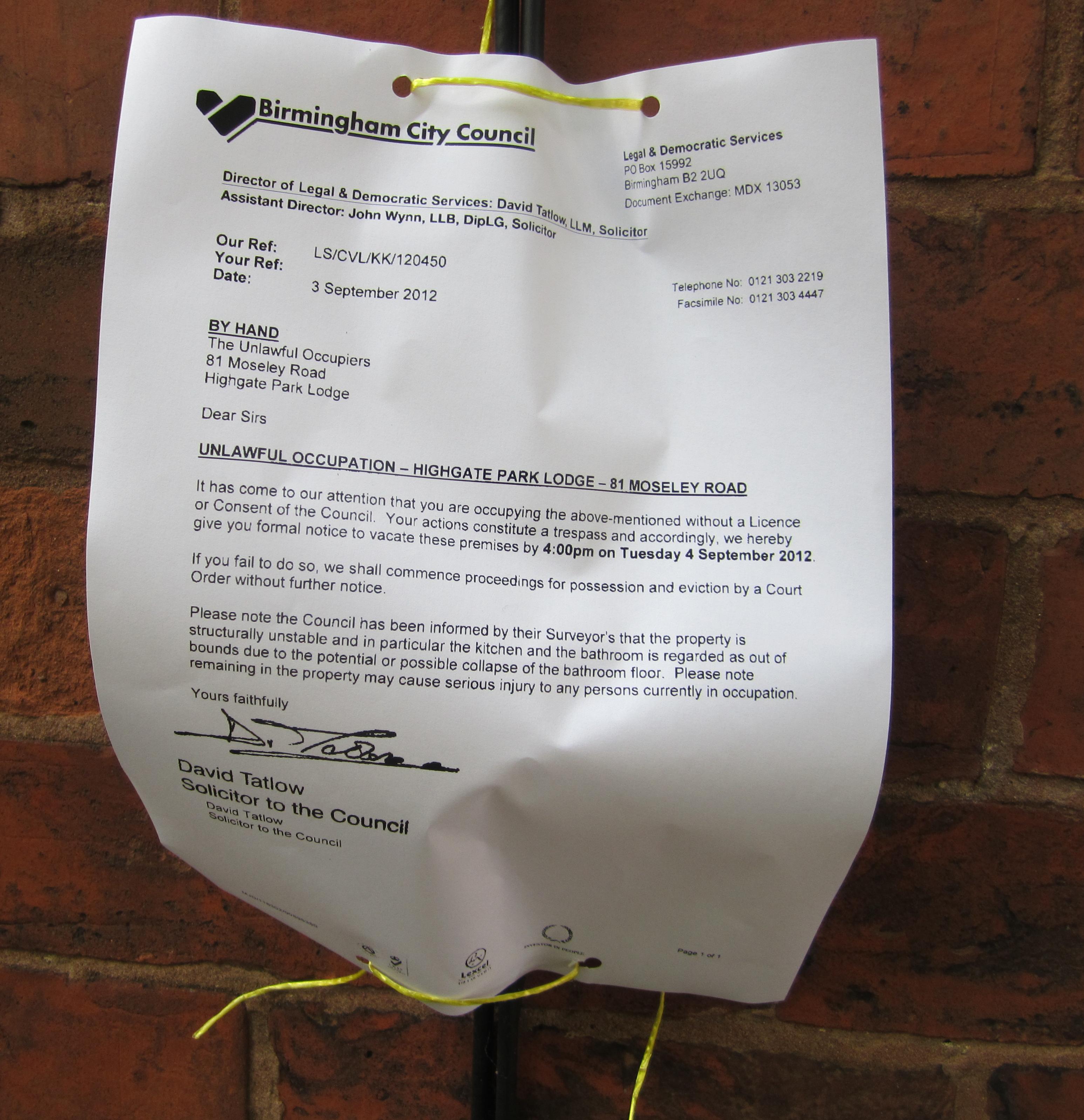Under the rules that govern eviction actions, an eviction is a type of lawsuit called a forcible or special detainer. A landlord can file an eviction action against a tenant for nonpayment of rent, if the tenant has breached the lease, or if the tenant has committed a crime. Eviction actions seek the eviction of the tenant and the repossession of the rental property. They may also be filed if the tenant misrepresented information to the landlord or has unauthorized occupants in the residence.
This is called a "redemption tender" and it can be given to the court either before or at the return date. The court must then continue the hearing for 10 days to allow for the money to be paid to the landlord. If it is paid in full within those 10 days, then the court will dismiss the case and you can stay. The 14-day notice is to be served to you, or a person of suitable age and discretion in your household, in person, or posted on your door and sent to you in the mail. Incorrect service in and of itself does not invalidate an eviction action against you, though it may become a defense in your eviction. It is likely if payment is not received in full within the 14-day timeline, and the tenant does not vacate the unit within 14 days, that the landlord will proceed to eviction court.
The worst thing a tenant can do is ignore the notice or not communicate with the landlord about the notice or their inability to pay the rent. Keep in mind it is not in the landlord's financial interest to evict you, as it typically causes considerable financial loss for them. Negotiation with your landlord can sometimes be helpful. But if the landlord hears nothing from the tenant, they may assume that their only recourse is to file an eviction lawsuit.
Some tenants choose to leave within the 14-day timeline because vacating may allow them to avoid the eviction lawsuit. The landlord may still be able to file a lawsuit against them or send them to collections in an attempt to recover money they owe. A 14-day notice to pay or vacate can be served upon a tenant who is even one day behind or one penny short in rent. Most rental agreements indicate a due date for the rent, usually the first of the month, and some indicate a grace period before the rent is to be considered late, usually three to five days later.
The Residential Landlord-Tenant Act in Washington State does not specifically entitle tenants to a grace period of any kind. If the grace period passes and you have not paid your rent in full, your landlord can serve you with a 14-day pay or vacate notice and issue a late fee. If you are not able to pay the rent you owe, you do have the option of vacating the unit within the fourteen day timeline. This will prevent the landlord from taking you to eviction court, and you will avoid having an eviction lawsuit on your record. Turn in your keys and document to your landlord that you're vacating the unit, so your landlord can inform their attorneys not to file the eviction lawsuit. For information on how evictions can impact your ability to find rental housing, see Housing Search.
The landlord may NOT use private help to evict a tenant, even if the judgment orders the tenant to vacate. The landlord must file a notice of restitution and pay a fee. Notice forms are available in the small claims office. The Sheriff or a private process server will serve the tenant with the notice to vacate.
If the tenant still does not vacate the dwelling, the landlord must file for a writ of execution of judgment and pay additional fees. Only then will the Sheriff use physical force to remove the tenant. A tenant, including an indigent tenant, must take certain actions if they wish to stay in the property pending an appeal.
A tenant who fails to pay rent during this time can be evicted before a judge hears the appeal. What if I want to get someone out of my home, but we never signed a lease? However, a person allowed to live in someone else's home without any agreement to pay rent or become a tenant is a guest.
Guests do not have these rights, and guests who refuse to leave the property may be removed either by the police or through a trespass warrant issued by a magistrate. A waste, nuisance, or illegal activity notice is less common, but requires quick action by any tenant who receives one. Waste and nuisance, in this instance, are terms that indicate a gross offense on the part of the tenant, for example major destruction of the rental unit or an arrest on the property. It may also include criminal offenses, including drug- or gang-related crimes. This notice does not give the tenant the option of complying, but instead requires that the tenant vacate the property immediately in order to avoid an eviction lawsuit.
Sometimes the landlord may give a 3-day notice for waste or nuisance when it is not appropriate. Seek legal advice and assistance if you receive a 3-day notice to vacate for waste or nuisance. You may also receive an order to show cause with or soon after you receive the summons and complaint. This is a notice of the date of your court appearance, called the Show Cause Hearing. If the tenant responded to the lawsuit, both parties go to court. The show cause hearing is the tenant's chance to raise any and all defenses they have against the eviction lawsuit.
Tenants may be able to secure legal representation at the show cause hearing. The judge will hear both sides of the case and then make a ruling. The vast majority of evictions go in the landlord's favor. Non-native English speakers have the right to an interpreter provided by the court. Notify the court as soon as possible of your need for interpretation. Seek assistance and representation from legal services agencies at Legal Assistance Guide.
For more information on the show cause hearing, see Eviction and Your Defense. The landlord must provide a 3-day notice of eviction to pay rent due or vacate premises. Do not include day of delivery, weekends or holidays when calculating time. Notice may be posted on the door of the rental property or hand delivered to the tenant. If the tenant does not comply with the notice in the time allowed pursuant to the notice the landlord may file an Eviction Complaint with the Clerk.
A copy of the 3-day notice must accompany the complaint at the time of filing. After delivering notice to the tenant, and waiting the appropriate time, a landlord can file a residential eviction action by filling out a complaint. Complaint and summons forms are available at the "small claims office" at the courthouse located in Coquille. Fees are required, and the landlord must bring a copy of the eviction notice to the clerk's office in order to file the action. If you win and the tenant is forced to leave, the judge will issue a Court Order, also known as a Warrant of Eviction or Writ of Restitution.
Either your tenant will voluntarily leave, or a law enforcement officer may be required to remove the tenant and their belongings. Based on the lease agreement and local laws, your tenant may be responsible for paying your court filing fees, attorney fees, unpaid rent, and/or damages and penalties. What type of notice does a landlord have to give in a non-payment of rent case? If a landlord wants to evict you for not paying rent, the landlord must give you a written notice to either move or pay rent in 5 days. If you do not pay, the landlord can start an unlawful detainer action in General District Court . The tenant can pay all of the rent and any late fees any time before the lawsuit is filed and avoid eviction.
If the eviction action has been filed, then the tenant must pay all past due rent, late fees, attorney's fees and court costs. If the tenant does so before a judgment is entered, he can avoid eviction. After a judgment has been entered, reinstatement of the lease is solely in the landlord's discretion. If you lose in court, you will be issued a judgment in the amount of money you owe in rent, court costs, attorney's fees, and other fees.
The Sheriff will also serve you with a writ of restitution, the notice of when the sheriff is coming to oversee your removal from the property if you have not already vacated. The deadline will be 3-4 days from the court date, the sheriff's name and phone number will be posted on the top of the writ. The date will list 12 am as the time of the eviction, but the sheriff will not show up to remove you at midnight. The sheriff may come to remove you and your belongings from the property any time after midnight of the date listed. If a judgment for possession is ordered by the court, the landlord can enforce the judgment by having the court clerk issue a Notice of Restitution for a fee.
The notice is served on the tenant and gives the tenant four days, not counting the date it was served, to move from the premises. The landlord must make arrangements for service with either the sheriff's office or a private process server. If the notice is not complied with, the landlord must return to the court to request a Writ of Execution and pay an additional fee and cost for service. The Court issues the Execution, which is given to the sheriff's office for service.
The landlord has to cooperate with any such agency that has promised to pay the rent. If the landlord doesn't cooperate, and the tenant has a warrant for removal, or is within three business days after being locked out, the tenant can file an order to show cause with the court. The order to show cause will force a resolution of the case in court. If you do not respond to the Summons and Complaint, you will automatically lose the eviction. The deadline for your response will generally be one week from the date you received the Summons and Complaint.
Your answer will give you an opportunity to explain the circumstances surrounding the eviction and to present any defenses you have against the eviction lawsuit. See Legal Assistance Guide to find a legal aid agency to assist you with your response. On the front page of the Summons there is a date for response.
If you do not respond by that date, you will get a default judgment against you and will automatically lose the lawsuit. You can use forms to assist with your response, but it doesn't have to be in any particular format. However, your answer to the Summons and Complaint must be submitted to the court in writing prior to the due date in order to not automatically waive your right to a court hearing. If you want an opportunity to appear in court, at the bare minimum you must inform the landlord's attorney that you intend on appearing by filing a Notice of Appearance. It is very important that you document that the landlord or their attorney received your response before the deadline.
You can fax it to their office and print out a fax confirmation sheet, or you can hand deliver it to their office. Ask them to date and sign for it and note the specific time it was received. If you do not get this money from the tenant, you do have a few options to still get your money. When there is not a rental agreement, you must give the tenant a 7-day or 15-day notice to vacate. If the rent is paid weekly you must give a 7-day notice. If the rent is paid monthly you must give a 15-day notice.
If the tenant does not comply within the time allowed pursuant to the notice the landlord may file an eviction complaint with the Clerk. A copy of the 7-day or 15-day notice must accompany the complaint at the time of filing. The tenant may pay the landlord or his agent at any time before the eviction occurs (called the "right to redeem the premises"). The tenant can pay by cash, a certified check, or money order all past due rent and late fees, plus court costs and fees.
However, the tenant cannot redeem if he or she has 3 or more rent judgments against him or her in the 12 months before the eviction action . To recover attorney's fees in an eviction suit, a landlord must give a tenant who is unlawfully retaining possession of the landlord's premises a written demand to vacate the premises. The demand must state that if the tenant does not vacate the premises before the 11th day after the date of receipt of the notice and if the landlord files suit, the landlord may recover attorney's fees. The demand must be sent by registered mail or by certified mail, return receipt requested, at least 10 days before the date the suit is filed. If the tenant wins the eviction lawsuit, the case is dismissed. However, the eviction filing will still appear on the tenant's record, unless you get an Order for Limited Dissemination.
The landlord's attorney may offer the tenant a stipulation, or settlement agreement instead of going to court. Be sure and have an attorney look at any stipulation before you sign it. They can often have hidden or difficult consequences. Do not sign any stipulation if you cannot comply with it. An eviction is the process of getting a court order to remove a tenant and other occupants from a rental property.
The landlord or owner can evict someone from their property after receiving a court order. In Massachusetts, it is illegal for a landlord, on their own, to remove tenants and occupants and their belongings from a rented apartment, room, or home without first getting a court order. The court case that a landlord files to get a court order is called summary process .
The court order that allows a landlord to evict a tenant is called an execution. Even after a landlord gets an execution, only a sheriff or constable can move a tenant and their belongings out of the property. If rent arrears are not being claimed, and tenants have failed to leave at the end of a valid Section 21 notice period, landlords can apply for an accelerated possession order. Form N5B must be filled in and sent to the relevant local court (see GOV.UK for further information). Tenants will be given 14 days to challenge the application, following which a judge will either issue a possession order or decide to hold a court hearing. If a tenant fails to pay the rent on time, the landlord may ask the court to approve the tenant's eviction.
That means that a landlord cannot lock a tenant out or force a tenant out by turning off the heat, water, or electricity. If a landlord takes one of these actions without a court order, a tenant can call the police and an attorney or a legal services organization. Similarly, a landlord cannot use eviction to retaliate for filing a complaint or lawsuit. An Eviction Case is a lawsuit brought to recover possession of real property, usually by a landlord against a tenant. The Texas Property Code, Chapters 24, 91, 92, 93, and 94, govern the relationship between landlord and tenant, tenancies, and eviction proceedings. After obtaining a court order to evict a tenant, a landlord wishing to pursue an eviction should fill out theEviction Data Form, Adobe required before contacting the Civil Unit for processing.
Additionally, please provide our office with all items listed on theWrit of Restitution Intake Sheet. Detectives will serve the tenant or post a residence with a writ of restitution or court order. If the tenant has not moved by the date on the writ of restitution or court order, the detectives will assist the landlord in evicting the tenant. The detectives' assistance will include enforcing the court order and ensuring the peace.
Can A Court Vacate Its Own Order The advance fee for service of the writ includes one hour of the detective's time at the eviction. If you anticipate the eviction may require additional time, you must notify the assigned detective in advance and additional fees may apply. The landlord is responsible for providing the moving crew and all other needed items. Landlords are encouraged to contact the detective prior to the physical eviction. There are some exceptions which can be found under the RCW links above. Additional information can be found in theProcedures for Writs of Restitution.
In justice court, the tenant is not required to file a written answer. They are allowed to do so if they disagree with the claims in the suit. If you do not file an answer, you will need to show up to the hearing or risk a default judgmentagainst you and in favor of the landlord. The hearing will be set for no sooner than 10 days after the suit was filed and no later than 21 days. Once the time stated in the notice to vacate has passed, a landlord can file a suit to evict. This suit should be filed in the justice court where the rental property is located.






















No comments:
Post a Comment
Note: Only a member of this blog may post a comment.